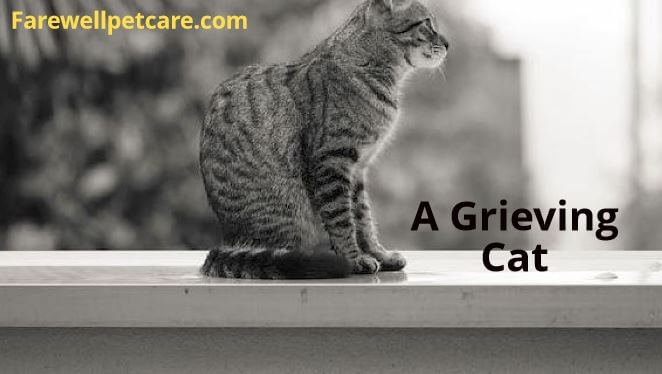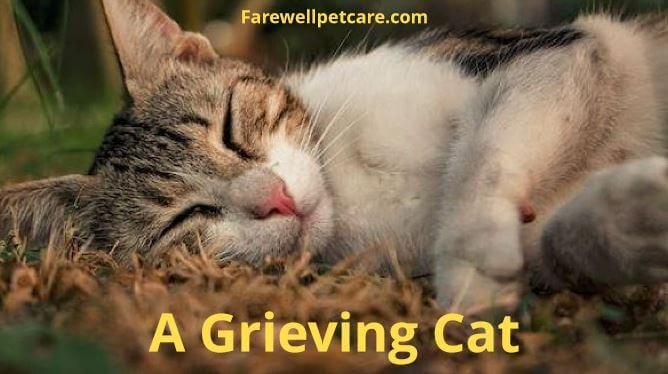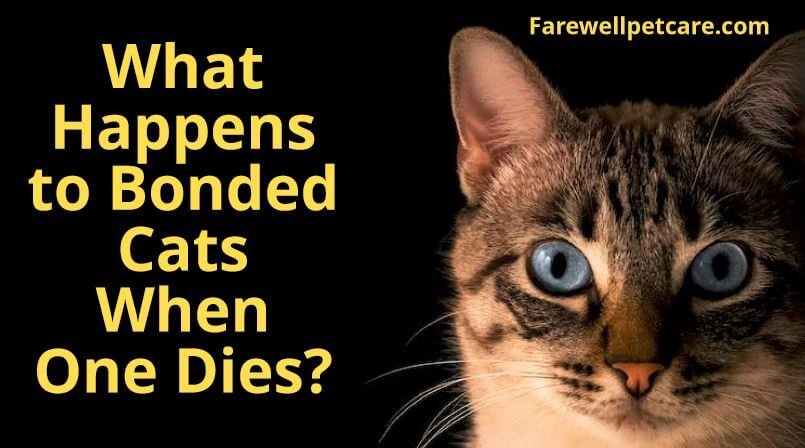What happens to bonded cats when one dies? Does the surviving cat understand death as a permanent thing? And if they know and are capable of mourning, for how long do they grieve the demise of a loved one?
Bonded cats exhibit behavior shifts following losing a feline companion, which could be translated as grief. They may become withdrawn, more clingy, lose their appetite, or change their sleeping patterns; the list is endless. Extra attention and reassurance will help a cat cope with grief.
Keep reading this post to learn more about feline bereavement. I’ll discuss what happens to bonded cats when one dies, including their grieving process, the signs to look out for, and how to help them cope with grief.
5 Signs of a Grieving Cat

As mentioned, grieving happens to bonded cats when one dies. The following are the common signs of a grieving cat you should look out for:
1. Restlessness
We all know cats spend much of the day sleeping or lazing around. Their predatory instincts make the wild cats spend much of their time preserving energy for hunting.
On the other hand, these instincts render domesticated cats inactive for extended periods with random bursts of activity and play.
This behavior can change radically when there’s a disruption in a household, including the death of another cat.
You may observe your cat getting up frequently and roaming the homestead as if looking for something or someone. The search may be accompanied by loud and frequent vocalization or quiet and anxious pacing.
Your cat may repeatedly pass through a familiar path or investigate sites in your home where they used to hang out before the friend’s demise.
Find Out: How to Comfort a Dying Cat in 6 Simple Ways
2. Change in Vocalization
Vocalization is the most prevalent behavior in grieving cats. As mentioned, a grieving cat may occasionally cry loudly when searching for their missing companion.
Loneliness can also result in loud and frequent cries at odd hours. Many cat parents report that their pets exhibit increased vocalization more often at night, particularly when they don’t sleep with another pet or human companion.
In contrast, a formerly noisy cat can become too quiet following the death of a feline friend.
Changes in vocalization are a symptom of distress and unease in animals and may continue for a few days or weeks.
3. Loss of Appetite
Like humans, animals lose their appetite when in distress.
A cat may undergo a severe upheaval in their everyday routine due to the demise of a housemate. This abrupt change can leave them upset and unwilling to eat. Food can no longer entice them—making them eat can become challenging.
You may observe your cat avoiding its bowl or gazing at the food without eating it. Lack of eating (and drinking) can be life-threatening if prolonged. Your kitty may potentially suffer from a fatal condition known as hepatic lipidosis, which can cause liver damage.
You should, therefore, get your cat checked immediately by a vet if they refuse food for more than a day.
4. Lethargy
Loss of appetite in cats often goes hand in hand with general inactivity due to decreased energy levels.
A grieving kitty can become highly lethargic and exhibit the following symptoms:
- Shyness or social withdrawal
- Inadequate grooming
- Disinterest in play and toys
- Sleeping more than usual
Your feline friend may lose interest in things they once enjoyed and be observed staring into space for extended periods instead of exploring their environment. Lethargy can also be a sign of depression.
Also Read: Do Cats Want to Be Alone When Dying? 8 Crucial Signs to Look For
5. Changes in Personality
Besides the behavioral changes, your grieving cat may show some personality shifts. Some cats may become unfriendly and resist responding when called. They may hide in places where they’re not easily seen.
Conversely, a previously stand-offish cat may suddenly want attention and affection. They may become more clingy and friendly, insisting on following you around the house, cuddling, and even sleeping with you.
How to Help a Grieving Cat
Now that you know what happens to bonded cats when one dies, your feline friend will benefit from your support and comfort during grieving.
Here are a few ways to help a grieving cat to cope with the situation:
Maintain Your Routine
Animals know our mood and general behavior changes and can respond immediately. You’ll therefore want to keep your routine and theirs as consistent as possible to give them a sense of normalcy during this stressful and uncertain period.
Try to act normal around them and avoid quickly removing the departed cat’s belongings.
Spend More Quality Time With Your Cat
You’ll need to dedicate more time to sit, play, groom, or even sleep with your cat.
Show affection by petting, maintaining eye contact, and talking to them more often.
Bonding with your feline companion will help divert their attention and provide them with much-needed comfort.
Encourage Eating
If your kitty loses their appetite, you’ll want to encourage them to eat by warming wet food, adding meat broth or fish oil to improve flavor.
It’s also best to consider giving them treats between meals to motivate them to eat. Additionally, sitting with them during meals will give them the needed reassurance.
Enrich Their Environment
A socially withdrawn cat can be supported by enriching their environment with treats, new toys, or even a new cat tree.
Environment enrichment can also help reduce your cat’s overly clinginess by directing their attention towards play and other things.
Consider hiding treats and toys around the home for them to find and be distracted while you’re away.
Limit Outdoor Access
It is essential to keep your cat indoors if they’re showing searching behavior. Limiting outdoor access will prevent them from wandering to unfamiliar territories and risky situations.
Some of the things you can do to achieve this include the following:
- Ensure the exit doors and windows are closed all the time. You can secure the windows with a screen if you need them open. Also, ensure your cat is not nearby whenever you open the door.
- You can install a pet-proofing spray unit near exit doors and windows you suspect your kitty can escape through. These equipment are motion activated and will release irritating but harmless liquid spray whenever your cat approaches the exit.
- Provide your cat with plenty of toys and activities to do indoors to keep them busy, distracting them from going outside. Consider setting up a cat tree in an open space. Your kitty will enjoy navigating it.
- Provide enough space in the house for your cat to roam about. This can include leaving doors to several rooms open.
- Position your cat’s litter box indoors in a quiet and secluded area. Also, clean it regularly. Cats tend to escape and do their business outside if they’re uncomfortable or the litter box is dirty.
- Train your cat to stay indoors, away from exits.
- Regularly walk your cat outside on-leash. This will help satisfy their curiosity and reduce their urges to escape.
Seek Veterinary Assistance
You’ll need medical assistance if your cat exhibits prolonged difficulty after a loss. Your vet might prescribe drugs that help adjust the behavioral problems associated with mourning. These medications may include anti-depressants and anti-anxiety drugs.
Do Cats Know If Another Cat Has Died?

It’s not yet established whether a cat understands death as humans do, but they certainly know when a fellow feline goes missing and that something in the home has changed.
Cats are affected by the absence of a human or animal companion, much so if they were closely bonded. They show this through behavioral changes, including those discussed in this article.
On the other hand, if there wasn’t a particular bond between the deceased and the surviving cat, the surviving cat may appear unaffected, showing no behavioral changes. `
Skeptics, however, believe that cats don’t know or mourn the loss of a companion cat because they do not understand death. And that the behavioral changes result from a disruption in their daily routine.
In other words, cats become stressed when their schedule is altered due to the absence of a fundamental figure in their lives.
For instance, with the death of a companion cat, the surviving cat may get upset because they miss interaction and playtime, but not because the deceased cat is permanently gone. Hence, a change in their behavior.
Still, others argue that cats react to the owner’s grief. Human behavior changes during grief, and your pet might feed off this, adding to the confusion they already have.
Skepticism aside, most animal behaviorists believe cats know and mourn when another cat has died. `
How Long Will a Cat Grieve the Loss of Another Cat?
There is no set time over which a cat can grieve the loss of another cat. Generalizing cats’ grieving timeline is challenging because of their flexible social structure.
However, information from various surveys and anecdotal reports suggests that there are three stages of feline grief, as follows:
- The first stage: This is an active but relatively short phase and shows itself in excessive vocalization, pacing, and searching. Here, the bereaved cat tries to find the one who passed away. They may be seen sniffing while moving from one room to another or waiting while looking out the windows.
- The second stage: This is where depression begins. It’s a more passive phase, manifesting in withdrawal symptoms such as inactivity and loss of appetite. The cat may appear sick for several weeks, requiring medical intervention to help them return to their usual feeding habits. These depression symptoms ease with time until the feline emerges into the final stage.
- The third stage: It involves acceptance. Here, the cat’s permanent character changes, such as being more affectionate toward their humans, become evident. Some may even become more vocal and active, and vice versa.
A cat can take days or even months to go through these grieving stages. Factors that affect how long a cat grieves include:
- Its innate personality
- How closely bonded it was with the deceased companion
- The supportiveness of its environment
What to Do If You Have 2 Cats and One Dies
If you have two cats and one dies, supporting the surviving cat through grief is essential. Consider applying the methods discussed in this article to help your cat cope with grief.
Also, experts believe that allowing your surviving cat to sniff and nuzzle the remains of their friend may be an essential part of their healing process. Your cat may stop searching for the missing companion after seeing their lifeless body.
You can, therefore, let them see the deceased body if there isn’t any risk of disease transmission. But beware that your surviving cat may get upset by the sight and smell of the body, causing them to react negatively.
Similarly, you’ll want to avoid getting a new cat soon after the demise as a replacement. It can backfire if the surviving cat is still in distress. Instead of bonding, your cat might experience more stress, making them hostile or hide from the new cat indefinitely.
I suggest giving your remaining cat time to grieve and adapt to life without their feline friend before introducing a new pet.
So, What Happens to Bonded Cats When One Dies?
While cats are known to be aloof and solitary, they can form strong emotional bonds with other housemates. The loss of a companion can create a massive void in the surviving cat’s life, and they may need help coping with the demise.
So look out for the signs of grief in your cat and take the necessary measures to support them.
Time will also help you and your pet’s healing process. Therefore be patient as the loss will become lighter to bear, and the bond between you and your feline friend will grow stronger and more beautiful.


Our youngest cat passed away. I have three other cats and they are showing signs of distress. 2 are hardly eating and there’s Vomitting. I’m not sure what to do. I realize the entire equation of our household has been affected. We were going to adopt another friend but after reading this we will wait. Any advice is appreciated . Thank you.
It was and with me. We can communicate on this theme.